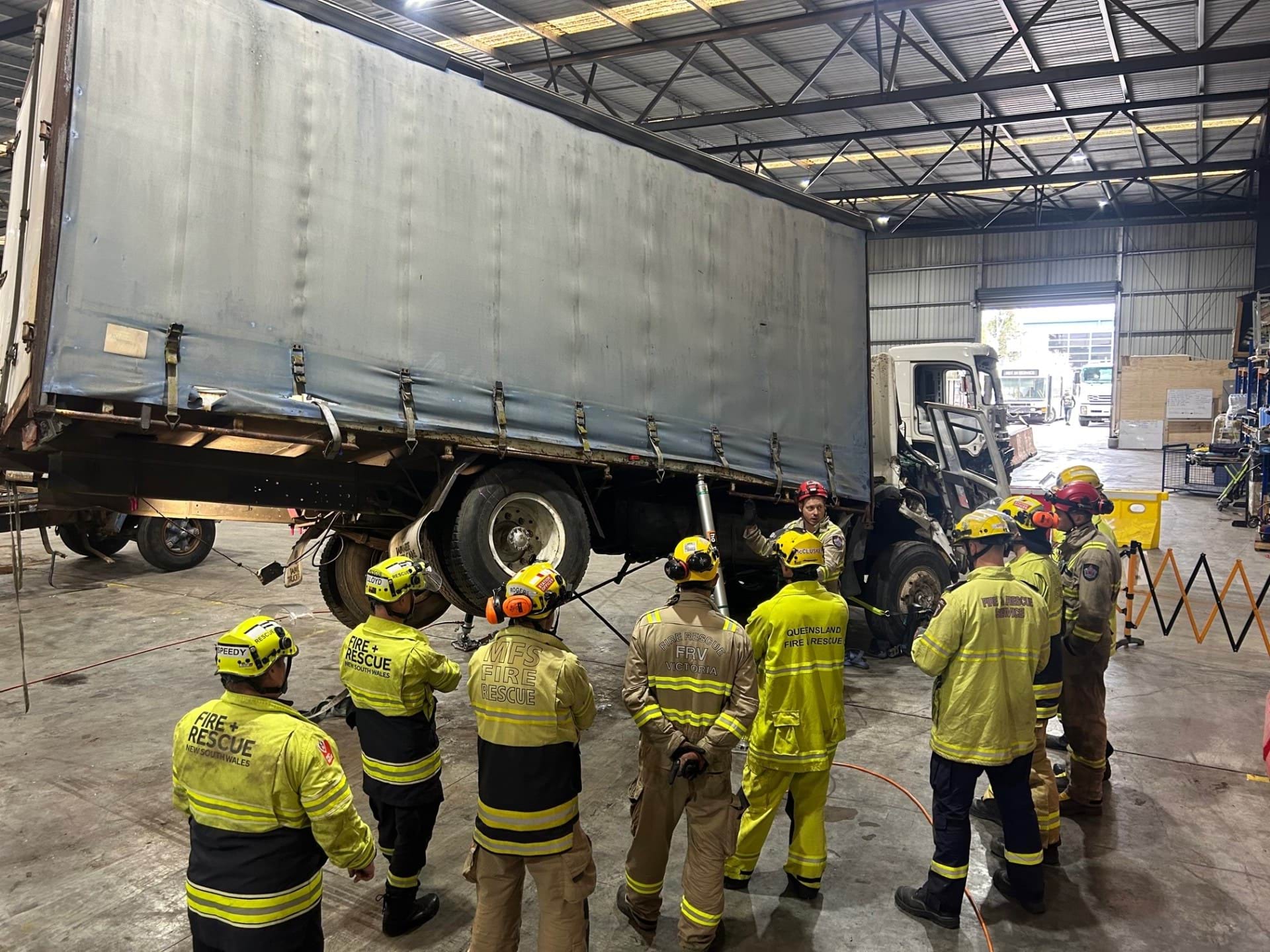- Published:
- Friday 29 August 2025 at 11:35 am
Heavy Rescue instructors from across Australia joined a week-long training workshop led by Fire Rescue Victoria (FRV) to learn world-class skills.
Heavy Rescue is one of FRV’s specialist skillsets used to respond to vehicle crashes, in addition to the complementary skillset of Road Crash Rescue Support (RCRS).
RCRS skills are used to free patients who are trapped in vehicle crashes and allow paramedics access to provide life-saving medical treatment.
However, more complex incidents may also need Heavy Rescue operators, who work to stabilise, access and, if needed, relocate vehicles including heavy vehicles such as trucks, buses, trains and heavy plant and machinery.
FRV is a national leader in Heavy Rescue skills and training through the use of its state-of-the-art Road Crash Rescue Academy.
The dedicated facility enables staff and instructors to find, test and refine the latest rescue techniques from other services around Australia and the world.
FRV’s Heavy Rescue operators work closely with other fire and rescue services, Ambulance Victoria and trauma teams to ensure their techniques work in line with their partner agencies to improve patient outcomes.
The interstate Heavy Rescue training event, hosted at FRV’s Road Crash Rescue Academy, involved instructors from:
- Fire and Rescue New South Wales (FRNSW)
- Queensland Fire Department (QFD)
- South Australia Metropolitan Fire Service (MFS) and
- Western Australia Department of Fire and Emergency Services (DFES).
The training showcased FRV’s advanced rescue capabilities and promoted national consistency across rescue operations. Led by FRV’s Heavy Rescue instructors, it featured a mix of hands-on practical drills and evidence-based theory.
Participants were put through their paces, with complex rescue scenarios involving heavy vehicles, electric vehicles and buses.
FRV Acting Deputy Commissioner Mark Kennedy said: “The purpose of the course is to bring together road rescue instructors from fire services from across the country so they can incorporate our Heavy Rescue training methods, which are above and beyond what is normally available in most fire services.”
FRV Acting Senior Station Officer Brendon Siinmaa said: “This workshop is a testament to FRVs leadership in Heavy Rescue training.
“It’s about sharing knowledge, refining techniques, and improving patient outcomes, while building a stronger, safer emergency services network across Australia.”
FRNSW Senior Firefighter Hugh Lloyd said: ‘The instructors here are certainly the leaders nationwide in both Heavy Rescue and Heavy Winch.
“It has been fantastic to bring all the states together, exchange details and techniques and extrication methods for heavy vehicles.”
MFS (South Australia) Station Officer Gideon Douglas said: “The main benefit is learning the huge amount of information that FRV has gathered over a long time at the academy.
“We have learned a huge amount of information that will change how we deliver Heavy and Technical Rescue in South Australia.
“The eight of us from South Australia are the heavy rescue instructor pool and we are being trained in that task by FRV - it’s probably the world leading heavy rescue training course that is available.”
QFD Station Officer Richard McCluskey said: “Right from the very start it has been a really good introduction of the basics, progressing through to some complex technical Heavy Rescue.
“We have identified holes in our training which now we can take to our fire service, and change our training packages based on the information and learnings taken from this course.
“Once we further develop our training packages for a better outcome, that will transfer to be able to deliver a better service to the public.”
DFES Senior Firefighter Andrew Strunk said: “What Victoria has done, in terms of the systems they have developed for lifting and stabilising heavy vehicles, reduces extrication times and gets patients out to hospital quicker.
“These systems allow safe access, stabilisation and removal of vehicles from the hazard.
“We’re getting people out a lot quicker with a lot less equipment but still operating safely for us and the patient. These are fantastic systems that we can look to implement in our own service.”
FRV Acting Deputy Commissioner Mark Kennedy said: “I’d like to acknowledge the hardworking team at the academy, who’ve worked tirelessly on putting this course together, but also all the other states that attended to take advantage of the joint training.
“Hopefully those states can take back this learning and disseminate it through their organisations as well.”
Updated
